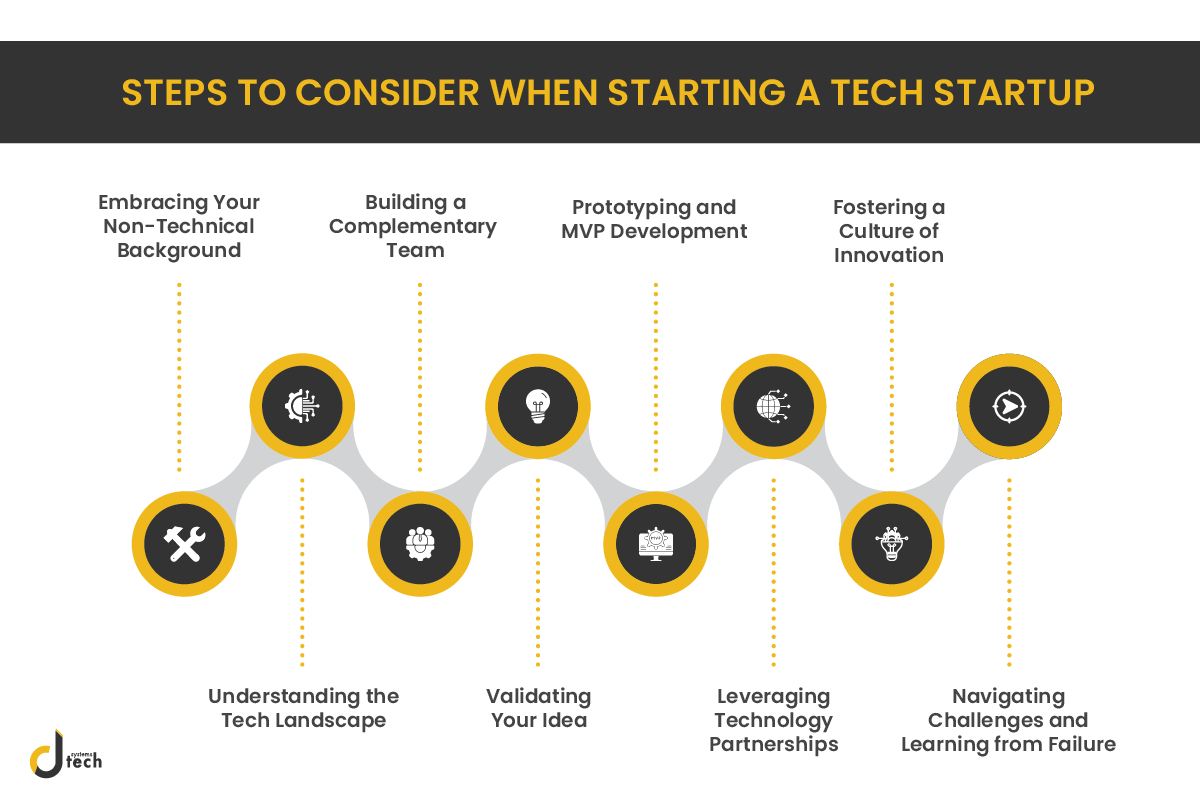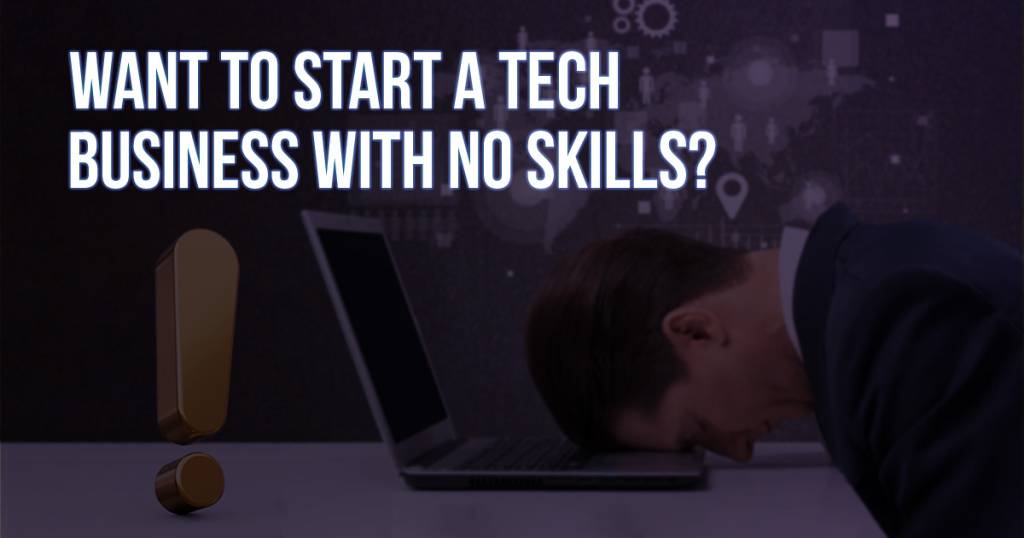Did you ever dream of becoming a tech entrepreneur only to realize that you have no technical skills and can’t start? You’re not alone. Many aspiring entrepreneurs are constrained by the misconception that a tech background is a necessity while starting a tech company.
But here’s the secret: it is not about how much code you can write but your vision, resoluteness, and your assembling of the correct team. This guide by a startup product development company will help you to open a successful enterprise in the field of technology, even though you haven’t got enough knowledge in the tech area. Make that dream come true now.
8 Steps to Consider When Starting a Tech Startup

By having a positive attitude, an ideal crew, and smart tactics, you’ll be able to convert your business idea into a successful one. The following are eight critical steps that will serve as your guide in building a tech startup. Each of these stages should be carefully considered for success in the market.
1. Embracing Your Non-Technical Background
Some people may think starting a tech company without being a techie is daunting but this could also be an advantage. Your new point of view may produce creative answers. Be proud of your specialization – maybe it’s marketing, finances or designing – and take advantage of using them together with the technology-oriented part of your business. Do keep in mind that diversified teams frequently result in more refined and prosperous firms.
2. Understanding the Tech Landscape
In most cases, you wouldn’t necessarily have to be a great coder but you have to at least know what technology is all about. Learn about recent shifts, innovations, and how software and hardware operate in general. With such information, you will be able to talk well with the technical team as well as have decisions made for you, and also keep time in this fast industrial area.
3. Building a Complementary Team
The next most important thing is to surround yourself with the right kind of people. Recruit skilled people as CTOs and developers. Include experts in the fields of marketing, design, finance, and operations on your team for balance. It is the battery of these skills that is your powerhouse and ensures that every aspect of the start-up caters for in the process.
Read More: Tips for Non-Technical Founders
4. Validating Your Idea
Validate your idea before embarking on developing it. Carry out detailed market studies, get feedback from prospective customers, and analyze the competitive environment. That step can determine whether there is a true need for a product or service. If that’s the case, it will save all the investment of time and cost.
5. Prototyping and MVP Development
Creating a prototype or MVP is no longer rocket science. Build a prototype using no/low code platforms. You should therefore create a prototype that could be an actual test bed in which you make the improvements based on actual users’ feedback.
6. Leveraging Technology Partnerships
Don’t hesitate to partner with tech specialists and development organizations. However, collaborations would ensure great technical assistance, mentoring, and access to resources. Find a business partner whose direction corresponds with your vision and who will push your venture ahead.
7. Fostering a Culture of Innovation
Promote innovation as well as challenge your team members in your team. Cultivate an atmosphere of open communication and controlled risk-taking. A culture of innovation will sustain continuous improvement in order for you to have a resilient and competitive startup.
8. Navigating Challenges and Learning from Failure
Not all challenges are bad – they constitute part of our growth.+ Embrace setbacks as learning experiences. Learn what went wrong and move forward with new vigor. Several technocrats failed while succeeding in tech business today. Keep moving forward.
Conclusion
As we conclude this blog, always keep in mind that your non-technical orientation is more of a chance rather than a handicap. Tech entrepreneurialism is dependent upon a diversity of thoughts and skills. If you can maintain a positive attitude, a good team, and validate your idea, then you’re almost there. Therefore, just jump and convert your tech startup dreams into real life.
Still not sure what to do? Contact us we are here to assist you in your success
FAQs Related to Starting a Tech Company
Can I start a tech company with no experience?
Yes, it is possible to set up a tech startup without any background. View yourself as an outsider with a fresh new look in a non-technical field. Concentrate on building a mixed and competent team, intensive market research, and utilizing technology alliances. You need to be a lifelong learner, with a constant growth mindset.
What is the best structure for a tech startup?
The best structure for a tech startup often involves a mix of technical and non-technical roles. A common setup includes a CEO handling overall strategy, a CTO overseeing technical aspects, and key roles like developers, designers, and marketers. Additionally, having advisors or mentors can offer valuable guidance. Adapt the structure based on your specific product and team strengths.
How long does it take to start a tech startup?
The timeline to start a tech startup can vary widely. It typically takes several months to a year to go from ideation to launch, but this can be shorter or longer depending on factors like complexity, market research, and team availability. Keep in mind that success may require ongoing development and refinement, so be prepared for a longer-term commitment.
What skills do I need to start a tech startup?
For building a technology company or a tech startup, key skills include:
- Entrepreneurial Mindset: Vision, risk-taking, and adaptability.
- Leadership and Management: Team-building and decision-making.
- Market Research: Understanding customer needs and competition.
- Communication: Effectively conveying ideas to both technical and non-technical team members.
- Basic Tech Understanding: Familiarity with industry trends and terminology.
- Problem-Solving: Creative solutions for challenges.
- Networking: Building partnerships and seeking mentorship.
How long do most tech startups last?
The lifespan of a technology startup may be very short. Many start-ups fail on average for five years. Nonetheless, these startups with success may expand further and achieve for years. Such factors determining longevity are market conditions, good management, product-market suitability, and flexibility to change with time. Given appropriate methods and implementation; a tech start-up may have a good run.


